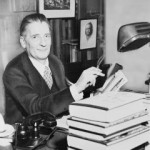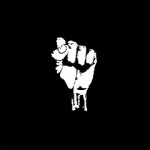“The most salient characteristic of life is its coerciveness,” said Spanish philosopher José Ortega y Gasset in his book Mission of the University: “it is always urgent, ‘here and now’ without any possible postponement. Life is fired at us point-blank.”
Another philosopher and artist, Wyndham Lewis, saw the problem this way: “Everything in our life today conspires to thrust most people into . . . a sort of trance of action,” he said in the 1957 preface to his book Time and Western Man. “Hurrying, without any significant reason, from spot to spot at the maximum speed obtainable, drugged in that mechanical activity, how is the typical individual of this epoch to do some detached thinking for himself? All his life is disposed with a view to banishing reflection.”
For Ortega y Gasset or Lewis, we’ve lost the time to think and contemplate and find inner calm, and I suspect it’s truer now than when they wrote. Schedules, regimens, agendas, infoclutter, datagluts, distractions — there’s more to keep up with now than at any other time in history. I can start my day one moment and then pause to find it’s already three in the afternoon. Sometimes I hardly know where the day has gone. I’m trapped in that trance of action, devoid of reflection, all busyness and no calm.
But I think my suspicion is probably bunk. It’s always been this way.
“[O]ne of the gravest perils which besets the ministry,” said Scottish minister Andrew Bonar, “is a restless scattering of energies over an amazing multiplicity of interests which leaves no margin of time and of strength for receptive and absorbing communion with God.”
Bonar was concerned with church life, but the overlap with Ortega y Gasset and Lewis is pretty clear. And, interestingly, Bonar died in 1892, long before our modern woes. You can go back even further and find the fourth- and fifth-century Christian monastic writers wrestling with aspects of the same problem.
Our “multiplicity of interests” yanks us off the contemplative path. That it can happen as easily in the fourth, fifth, nineteenth, twentieth, and twenty-first centuries says more about our inherent lack of discipline than our increasingly stimuli-rich environments.
We can filter those stimuli; we do it reflexively all the time. The trick is being mindful about it — filling that filtered space and time with something singular and substantive. Philosopher Immanuel Kant started each day with a few cups of tea and his pipe. According to biographer Manfred Kuehn, “The time he needed for smoking it ‘was devoted to meditation.’” Bonar similarly made prayer and meditation central to his day.
In his book, Thoughts in Solitude, Trappist monk and writer Thomas Merton said that “Ours is a time of anxiety because we have willed it to be so. Our anxiety is not imposed on us by force from outside. We impose it on our world and upon one another from within ourselves.”
So what if we stopped? What if we could step outside the “prescribed tracks” and snap out of the “trance of action” to collect our minds, gather the loose threads of thought, and regain focus? We need to if we have any hope of establishing and maintaining internal peace.
“Time is the real currency of our age,” as Robert Benson says in his helpful book In Constant Prayer, “and we have to manage our time in relation to our spiritual life as much as we do in relation to any other part of our lives.”
Time does not create itself. It is scarce and like any scarce commodity has to be cordoned off, fenced in, and protected — or it will be stolen at gunpoint.
Use a pipe, use a prayer book, whatever works for you. Find a practice to intrude in the coercive urgency of life. And do it now. Says Ortega y Gasset, “We cannot put off living until we are ready.” We never will be. The world never will be. Tell it to wait while you do the same.













